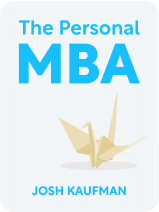

This article is an excerpt from the Shortform book guide to "The Personal MBA" by Josh Kaufman. Shortform has the world's best summaries and analyses of books you should be reading.
Like this article? Sign up for a free trial here .
Do you have a business idea in mind but aren’t sure whether it has profitability potential? What are some things you should consider before putting your idea in motion?
When you come up with a product idea, you might be tempted to jump right into development, without carefully considering whether and how profitable the venture will be. It’s important to resist that temptation and take some time into putting your assumptions to the test.
Here are some things to consider before you jump into development.
Evaluate Potential Products Before Investing
According to Kaufman, successful businesses engage in research and rigorously test the profitability potential of their ideas before they commit to developing them. This process helps them test their assumptions about how profitable the venture will be and prevents them from investing time and resources in projects that won’t pay off.
Kaufman suggests asking yourself five questions before developing potential products and services:
Question #1: How Much Will It Take to Get It Out There?
Consider how much time and money you’ll need to invest to create, market, and distribute your product or service. What resources will you need? How much research and development will it take to get it right? Estimate both your fixed costs, such as rent and salaries, and your variable costs, such as supplies and usage-based utilities.
Question #2: How Will You Finance It?
Consider if you’ll need to borrow money and what risks this will involve. If you intend to seek out investors, how much control will you lose and how will this affect your business decisions?
Question #3: How Much Demand Is There?
Consider how many people would want your offer and how much they’d be willing to pay for it. Calculate how many sales it will take to recoup your investment and make a profit.
Question #4: How Much Competition Is There?
Consider how your product compares to what competitors are offering. The more competitors there are, the more you’ll need to differentiate your offer and battle for customer loyalty.
Question #5: How Much Potential Is There to Expand Your Offer?
Consider if there are ways to build on your offer to generate future sales and profit from your investment. Can you adapt your offer or provide complementary products to fulfill additional needs?
(Shortform note: Business experts offer additional insights into why you should start planning ways to expand your offer. Your current business idea is likely to appeal to one type of consumer with specific needs. If you offer variations or complementary products and services, you’ll inevitably attract a wider range of consumers. This will increase your overall sales, provide financial stability, and allow you to compete more strongly in your industry.)
Overestimate the Risks of Proceeding With Your Idea
When you’ve come up with a product or service that you’re excited about, it’s often difficult to think about it objectively. This is because your eagerness for it to work prompts you to gloss over any information that doesn’t support its success. As a result, you underestimate the risks involved and find yourself unprepared to turn your idea into a profitable venture.
However, Kaufman notes, if you intentionally look for reasons why your idea won’t work—by overestimating the requirements and risks of proceeding with it—you’ll be able to make more accurate plans that help you to succeed. (Shortform note: Disaster avoidance experts suggest a practical way to withhold your excitement, objectively assess all relevant information, and identify potential risks: Imagine that your business idea has already failed and that you’re thinking about it retrospectively. Write out all of the plausible reasons for this failure. For example, the product was defective or the marketing department failed to attract attention. Then, brainstorm ways to solve these potential problems and integrate your solutions into your current business strategy.)

———End of Preview———
Like what you just read? Read the rest of the world's best book summary and analysis of Josh Kaufman's "The Personal MBA" at Shortform .
Here's what you'll find in our full The Personal MBA summary :
- A comprehensive overview of how businesses work
- The five key processes that underpin every business
- How to identify profitable opportunities to ensure business success






